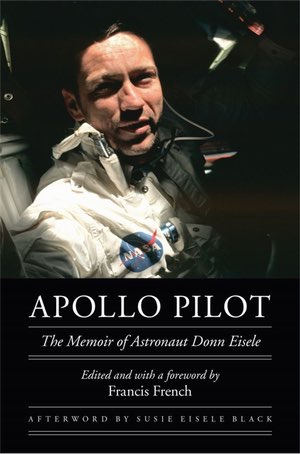Review: Apollo Pilotby Jeff Foust
|
| “When he kept a tight grip on the reins his direction was erratic, ambiguous, and arbitrary, and sometimes when we really needed a decision his direction was non-existent,” he wrote of Schirra. |
The book is French’s efforts to construct a memoir out of those materials, an effort that involved challenges both literary—French said there “at least five different drafts” among those documents—and physical, as the text on some papers had faded to the point of being nearly illegible. However, he was able to turn those papers into a coherent, if limited, story of part of Eisele’s life.
The result is a memoir focused almost exclusively on Eisele’s career as an astronaut. There’s little discussion about his childhood: in less than a page he goes from talking about growing up in Columbus, Ohio, to being in test pilot school and applying to be an astronaut. That initial application failed, but he applied in the next class in 1963 and made the cut.
Most of the book covers the preparations for, and the flight of, Apollo 7. That mission, the first test of the Apollo spacecraft with a crew on board, became infamous for perceived frictions between the crew, commanded by veteran astronaut Wally Schirra, and ground controllers that effectively ended the careers of Eisele and Walt Cunningham, the third crewmember. The book, though, doesn’t play up such tensions, although Eisele acknowledged “there was a real stink” on the ground when the crew decided not to do a live television broadcast while preparing to rendezvous with their upper stage, out of concerns the broadcast would be distracting, particularly if they had to troubleshoot technical issues with it while also getting ready for the rendezvous.
Eisele, though, saw that episode as indicative of the broader issues he encountered on the Apollo program. “We were frequently at odds with somebody,” he wrote, including engineers, managers, and doctors, becoming unwilling to trust anyone’s judgment completely, based on past experience when astronauts placed too much trust in them. “Apollo 1 would seem to be a good example of what happens when you do.”
What makes Apollo Pilot particularly interesting is Eisele’s unvarnished assessments of many of the people he worked with at NASA. That included his Apollo 7 commander, Schirra, who comes off in the book as someone uninterested in the technical details of the mission and more concerned in making himself look good. “When he kept a tight grip on the reins his direction was erratic, ambiguous, and arbitrary, and sometimes when we really needed a decision his direction was non-existent,” he wrote of Schirra, while also acknowledging his charisma and “indomitable sense of humor.”
| His memoirs conclude shortly after the end of the mission, so he does not discuss what happened afterward: his divorce and remarriage that reportedly also kept from getting another flight assignment, and his decision to leave NASA a few years later. |
Others at the agency also don’t come off well. Eisele criticizes Charles Berry, the chief medical officer at the Manned Spacecraft Center, whose “duplicitous and politically motivated behavior engendered mistrust” among Eisele and colleagues. He singled out for blame for the Apollo 1 accident top NASA officials such as George Mueller and Joe Shea, the latter he accuses of a “colossal ego” that interfered with his judgment. Eisele also devotes several pages to the extramarital escapades of astronauts when either in California or Florida, although not naming any individual astronauts.
Eisele doesn’t discuss his personal life much in the book, only briefly mentioning his first wife and his children in the first few chapters before diving into the details of Apollo 7. His memoirs conclude shortly after the end of the mission, so he does not discuss what happened afterward: his divorce and remarriage that reportedly also kept from getting another flight assignment, and his decision to leave NASA a few years later. Susie Eisele Black (who passed away in 2014) contributed an afterword to the book that fills in some of those details, including how Eisele was ostracized by his fellow astronauts for years because of his divorce, even though his was just the first of many that involved astronauts.
In that afterword, she adds that she thinks that Eisele would have expanded that fragmentary memoir if he had more time: he was distracted by a number of business pursuits in his post-NASA years, as well as spending two years as a Peace Corps director in Thailand. French acknowledges that, had Eisele taken that time, the final product might have been quite different from the book, including some of the critical accounts of fellow astronauts and others at NASA. Fortunately, Apollo Pilot gives us at least a partial account of the life and career of one astronaut from the early Space Age who might otherwise be overlooked.
